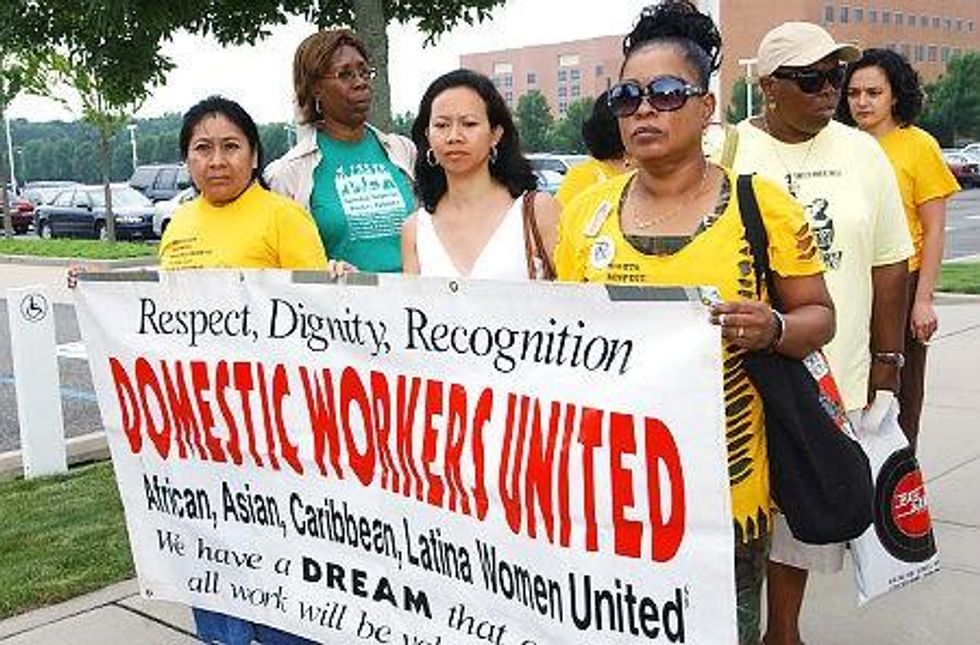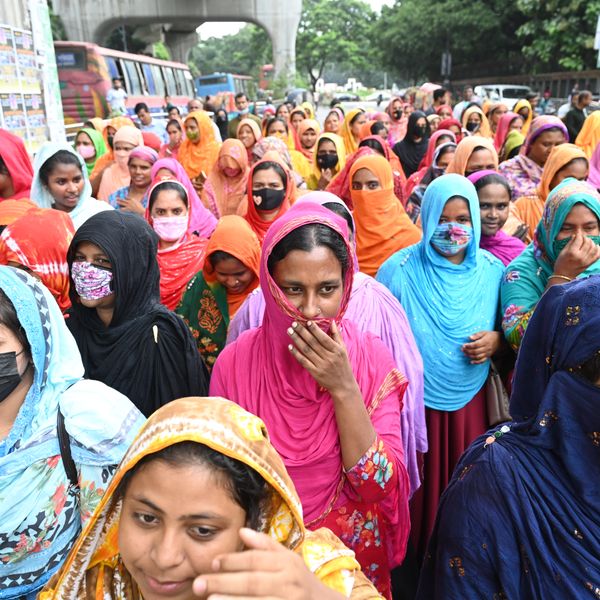Domestic Workers Aren't Members of the Family
GRITtv was in Los Angeles this month, at the AFL-CIO Convention. This year's meeting of the Nation's largest labor federation was hailed as historic for a lot of reasons.

Domestic workers were also at the heart of the big leap for labor rights which came immediately after the convention, when the Obama administration announced it will finally extend minimum wage and overtime protections to domestic workers, a change labor and community groups have pushed for.
Domestics have worked for poverty wages in miserable conditions in Americans' homes, for ever. The Fair Labor Standards Act or FLSA, which big labor celebrates, excluded domestic workers, and retail and service workers, and farm laborers. They didn't call it special rights for white men, but that's what it amounted to. Even when FLSA was updated in the 70s, domestic workers were still excluded. They're not workers, the lawmakers said, they're "companions" -- members of the family.
In LA, Lourdes Belagot Pablo, a 61 year old Philipina told GRITtv about what it's like to "companion" sick elderly clients in their homes, round the clock, 24 hours a day in four-day shifts. If she gets two hours of un-interupted sleep the whole time, she's lucky.
Pablo came here on a teaching visa -she taught math and physics at the university back home - but here she was forced to teach something different instead and when that didn't work out, she found herself jobless, paperless and thousands of dollars in debt to the immigration sharks who had brought her.
Her real family, let's be clear, is in the Philippines. In fact, after five years of no contact, she longs to see her 15 year old son on something closer than SKYPE. When they talked recently, he cried that he misses her.
The Obama administration's new protections which will take effect only in January 2015 are an achievement, but they won't make everything right for women like Lourdes. That's why the National Domestic Workers Alliance and others, are continuing to push for more protections through state legislation. (California looks as if it will become the third state to pass a statewide Domestic Workers Bill of Rights. The state Senate approved the bill on September 11.)
The AFL supported the FLSA change. What next? Will real inclusion for excluded workers follow? How about muscle and money to invest in the organizing work those workers deem necessary? A warm welcome is very nice but Domestic workers are all too used to being called family. As South African domestic Myrlie Witbooi told the convention upon receipt of the George Meany/Lane Kirkland Award for Human Rights:
"I can assure you many of you sitting here are our employers. You have us at your homes, when you are here."
"If I'm part of your family you need to let me sit at your table while you get up and you wash the dishes."
Big Labor is welcoming domestic workers like family. But are they getting up and washing the dishes?
An Urgent Message From Our Co-Founder
Dear Common Dreams reader, The U.S. is on a fast track to authoritarianism like nothing I've ever seen. Meanwhile, corporate news outlets are utterly capitulating to Trump, twisting their coverage to avoid drawing his ire while lining up to stuff cash in his pockets. That's why I believe that Common Dreams is doing the best and most consequential reporting that we've ever done. Our small but mighty team is a progressive reporting powerhouse, covering the news every day that the corporate media never will. Our mission has always been simple: To inform. To inspire. And to ignite change for the common good. Now here's the key piece that I want all our readers to understand: None of this would be possible without your financial support. That's not just some fundraising cliche. It's the absolute and literal truth. We don't accept corporate advertising and never will. We don't have a paywall because we don't think people should be blocked from critical news based on their ability to pay. Everything we do is funded by the donations of readers like you. Will you donate now to help power the nonprofit, independent reporting of Common Dreams? Thank you for being a vital member of our community. Together, we can keep independent journalism alive when it’s needed most. - Craig Brown, Co-founder |

Domestic workers were also at the heart of the big leap for labor rights which came immediately after the convention, when the Obama administration announced it will finally extend minimum wage and overtime protections to domestic workers, a change labor and community groups have pushed for.
Domestics have worked for poverty wages in miserable conditions in Americans' homes, for ever. The Fair Labor Standards Act or FLSA, which big labor celebrates, excluded domestic workers, and retail and service workers, and farm laborers. They didn't call it special rights for white men, but that's what it amounted to. Even when FLSA was updated in the 70s, domestic workers were still excluded. They're not workers, the lawmakers said, they're "companions" -- members of the family.
In LA, Lourdes Belagot Pablo, a 61 year old Philipina told GRITtv about what it's like to "companion" sick elderly clients in their homes, round the clock, 24 hours a day in four-day shifts. If she gets two hours of un-interupted sleep the whole time, she's lucky.
Pablo came here on a teaching visa -she taught math and physics at the university back home - but here she was forced to teach something different instead and when that didn't work out, she found herself jobless, paperless and thousands of dollars in debt to the immigration sharks who had brought her.
Her real family, let's be clear, is in the Philippines. In fact, after five years of no contact, she longs to see her 15 year old son on something closer than SKYPE. When they talked recently, he cried that he misses her.
The Obama administration's new protections which will take effect only in January 2015 are an achievement, but they won't make everything right for women like Lourdes. That's why the National Domestic Workers Alliance and others, are continuing to push for more protections through state legislation. (California looks as if it will become the third state to pass a statewide Domestic Workers Bill of Rights. The state Senate approved the bill on September 11.)
The AFL supported the FLSA change. What next? Will real inclusion for excluded workers follow? How about muscle and money to invest in the organizing work those workers deem necessary? A warm welcome is very nice but Domestic workers are all too used to being called family. As South African domestic Myrlie Witbooi told the convention upon receipt of the George Meany/Lane Kirkland Award for Human Rights:
"I can assure you many of you sitting here are our employers. You have us at your homes, when you are here."
"If I'm part of your family you need to let me sit at your table while you get up and you wash the dishes."
Big Labor is welcoming domestic workers like family. But are they getting up and washing the dishes?

Domestic workers were also at the heart of the big leap for labor rights which came immediately after the convention, when the Obama administration announced it will finally extend minimum wage and overtime protections to domestic workers, a change labor and community groups have pushed for.
Domestics have worked for poverty wages in miserable conditions in Americans' homes, for ever. The Fair Labor Standards Act or FLSA, which big labor celebrates, excluded domestic workers, and retail and service workers, and farm laborers. They didn't call it special rights for white men, but that's what it amounted to. Even when FLSA was updated in the 70s, domestic workers were still excluded. They're not workers, the lawmakers said, they're "companions" -- members of the family.
In LA, Lourdes Belagot Pablo, a 61 year old Philipina told GRITtv about what it's like to "companion" sick elderly clients in their homes, round the clock, 24 hours a day in four-day shifts. If she gets two hours of un-interupted sleep the whole time, she's lucky.
Pablo came here on a teaching visa -she taught math and physics at the university back home - but here she was forced to teach something different instead and when that didn't work out, she found herself jobless, paperless and thousands of dollars in debt to the immigration sharks who had brought her.
Her real family, let's be clear, is in the Philippines. In fact, after five years of no contact, she longs to see her 15 year old son on something closer than SKYPE. When they talked recently, he cried that he misses her.
The Obama administration's new protections which will take effect only in January 2015 are an achievement, but they won't make everything right for women like Lourdes. That's why the National Domestic Workers Alliance and others, are continuing to push for more protections through state legislation. (California looks as if it will become the third state to pass a statewide Domestic Workers Bill of Rights. The state Senate approved the bill on September 11.)
The AFL supported the FLSA change. What next? Will real inclusion for excluded workers follow? How about muscle and money to invest in the organizing work those workers deem necessary? A warm welcome is very nice but Domestic workers are all too used to being called family. As South African domestic Myrlie Witbooi told the convention upon receipt of the George Meany/Lane Kirkland Award for Human Rights:
"I can assure you many of you sitting here are our employers. You have us at your homes, when you are here."
"If I'm part of your family you need to let me sit at your table while you get up and you wash the dishes."
Big Labor is welcoming domestic workers like family. But are they getting up and washing the dishes?

